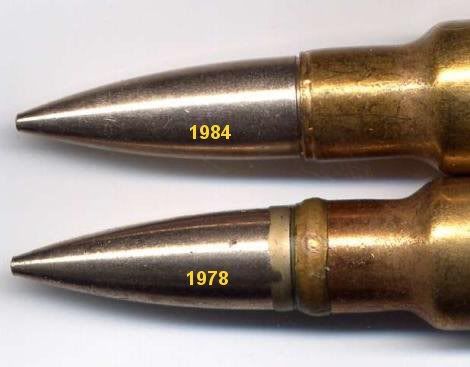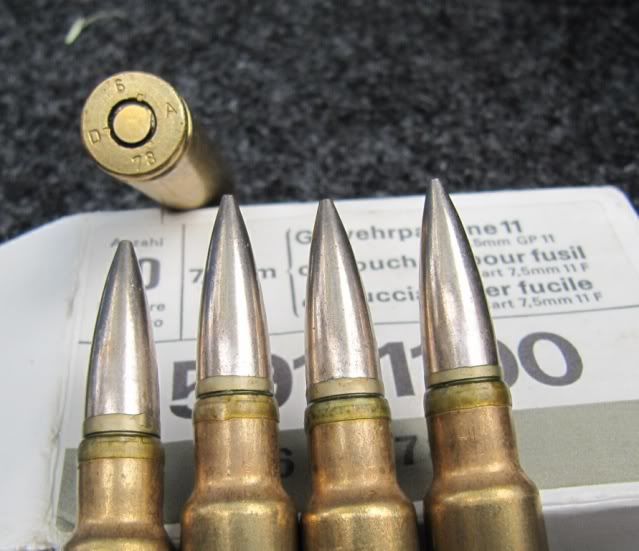Quote:
Also, I don't believe that there was any "tincan ammo coverup."
Cold welding of the bullets into the cases was known to be an issue soon after adoption of Many millions of these rounds were fired in military training and exercises with virtually no issues, even with low-number Sprinfields.
|
This is too big for one message, so let me address Hatcher and Hatcher's Notebook.
I think you are in error about the general issue of tin coated bullets. Per Hatcher’s Notebook and Naramore's Handloader’s Manual, the tin can ammunition was withdrawn after the National Matches.
If you read Hatcher’s Notebook, you see that way back in 1920 the Army was having problems with their un safe at any speed single heat treated receivers and their poorly made wartime ammunition. In stead of admitting that they paid good taxpayer money buying awful ammunition and then issued it on the firing line, they decided to blameshift this issue on the civilians. Shooters at the time were greasing their bullets to eliminate bullet fouling. They had been doing it for decades. The Army ran some bogus tests and “proved” the grease was causing the rifles to break.
In 1921, the Army used tin as a bullet coating, to eliminate bullet fouling, and the tin cold welded to the case neck and created a bore obstruction. Shooters were still using greased bullets and the Army totally ignored the cold welding and blamed blown up rifles on bullet grease. Hatcher wrote a very long section in his book, “Hatcher’s Notebook” passing all the blame to bullet grease and civilians. Hatcher never really said that lubricated cartridges were bad, but he sure repeated the Army line that greased bullets were dangerous. The theory was grease is incompressible (true) and pinches the case neck, (not true) and causes pressures to climb. The false assumption is that the grease stays put, but in fact, it moves.
I believe Major Naramore to be an honest reporter, there is none of the finger pointing misdirection at the civilians that you find in Hatcher’s Notebook. Major Naramore is clear and distinct, tin caused the bore obstruction. If you read “Handloader’s Manual”, published 1937, author Earl Naramore, page 158, you come across this section:
Quote:
|
The ammunition made a Frankford Arsenal for the 1921 National Matches had bullets heavily plated with tin. This ammunition was satisfactory when first loaded. Tin has an affinity for brass and in this ammunition the tin combine with the insides of the case necks, forming a union between the bullet and the case just as though the bullets were soldered in place. This union is so strong that it is impossible to extract the bullets and if the ammunition is fired, dangerous pressures will develop. Most of this lot of ammunition, the only one so loaded, has been shot or destroyed, but anyone running across any of it should destroy it or preserve it only as a curiosity in the development of ammunition . It should be under no circumstances be fired. The markings on the case heads is, F.A. 21-R.
|
You would think Hatcher would have been aware of this, as on the frontpiece of the book, Lt Col. Julian S. Hatcher is given credit for the book sketches.!
At least five M1903’s were blown after the 1921 matches up with FA 21R. Three were double heat treat rifles and two were single heat treat. You would think Hatcher would have been aware of this as these incidents are recorded in his book!
If you have ever read the bio’s put out on Hatcher, not only was he the head of the Ordnance Corp, he visited Switzerland, shot in Switzerland, and undoubtedly got to shoot and examine their service weapons.
The Swiss had been greasing their bullets for decades. I don’t know how far back it goes, might have been since 1888. You can find claims that the grease ring increased accuracy, but they stopped greasing bullets around 1984 because the grease caused difficult extraction in cold weather.
You would think Hatcher would have seen this ammunition, but regardless, is Hatcher right, do greased bullets dangerously raise pressures and the Swiss, who fired millions of these things, just never noticed their rifles blowing up?


Incidentally, the American Rifleman had a dope bag article on greased bullets in the 60’s or 70’s. They mentioned the Austrians greased their steel service rifle bullets back in the 1890’s and noted that Parker of England was still selling “never nickel” grease in a 1969 catalog.
So, the main point is, are greased bullets dangerous, as Hatcher said?